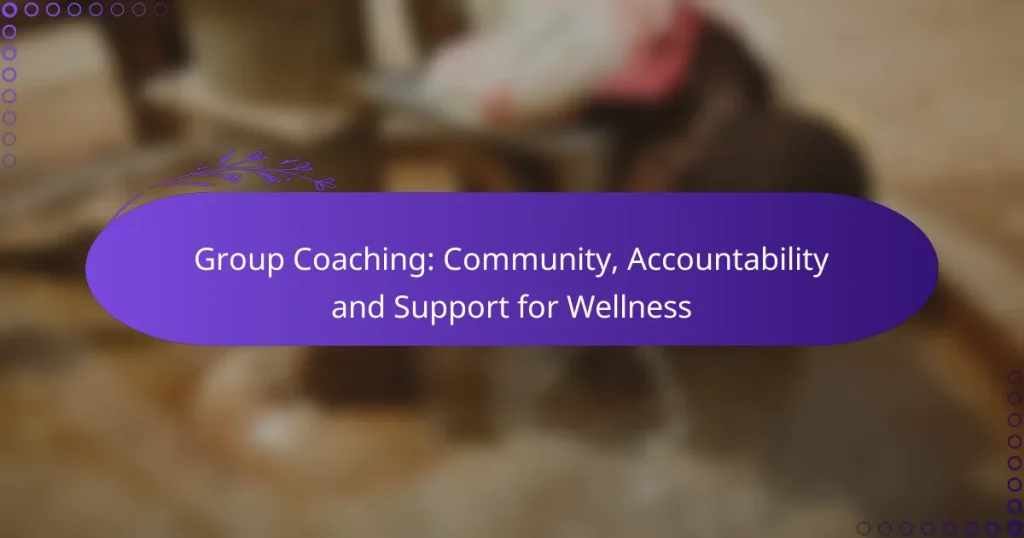Group coaching serves as a powerful tool for enhancing wellness by creating a supportive community where individuals can share experiences and hold each other accountable. In urban settings, this collaborative approach not only fosters motivation but also helps participants navigate the challenges of a fast-paced lifestyle. By engaging in group coaching, individuals can benefit from diverse insights and collective encouragement, making their wellness journey more enriching and effective.

How does group coaching enhance wellness in urban areas?
Group coaching enhances wellness in urban areas by fostering a sense of community, providing accountability, and sharing experiences among participants. This collaborative environment helps individuals stay motivated and committed to their wellness goals, which can be particularly beneficial in the fast-paced urban lifestyle.
Community support networks
Community support networks are vital in urban group coaching, as they create a sense of belonging among participants. These networks encourage individuals to connect with others who share similar wellness goals, fostering friendships and support systems that extend beyond the coaching sessions.
In urban settings, where isolation can be common, having a reliable community can significantly improve mental and emotional well-being. Participants often share resources, tips, and encouragement, which enhances their overall wellness journey.
Increased accountability
Group coaching increases accountability by establishing a shared commitment among participants. When individuals know they are part of a group, they are more likely to adhere to their wellness plans and attend sessions regularly.
This accountability can manifest through regular check-ins, goal-setting discussions, and progress tracking. Urban participants may find that the collective motivation helps them stay on track, making it easier to overcome obstacles in their wellness journey.
Shared experiences and motivation
Shared experiences in group coaching create a powerful motivational force. Participants can relate to each other’s challenges and successes, which fosters a supportive environment where everyone feels understood and encouraged.
In urban areas, where diverse backgrounds and lifestyles converge, these shared experiences can lead to innovative approaches to wellness. Participants can learn from one another, exchange ideas, and celebrate milestones together, reinforcing their commitment to personal growth and health improvement.

What are the benefits of group coaching for individuals?
Group coaching offers individuals a supportive environment that fosters personal growth through community, accountability, and shared experiences. Participants benefit from collective motivation and diverse insights, enhancing their wellness journey.
Improved mental health
Group coaching can significantly enhance mental health by providing a sense of belonging and reducing feelings of isolation. Engaging with others who share similar challenges fosters empathy and understanding, which can alleviate stress and anxiety.
Regular group interactions encourage open discussions about mental well-being, allowing individuals to express their feelings and gain support. This shared experience can lead to improved self-esteem and resilience over time.
Access to diverse perspectives
One of the key advantages of group coaching is the access to diverse perspectives that participants bring to the table. Each member’s unique experiences and insights contribute to a richer understanding of various wellness strategies.
Hearing different viewpoints can inspire new approaches to personal challenges and encourage creative problem-solving. This exchange of ideas can help individuals discover methods that resonate with them, enhancing their overall wellness journey.
Cost-effective wellness solutions
Group coaching is often a more affordable option compared to one-on-one coaching sessions. By sharing the costs among multiple participants, individuals can access high-quality coaching at a fraction of the price.
Many group coaching programs offer flexible payment options, making it easier for individuals to commit to their wellness goals without financial strain. This cost-effectiveness allows more people to benefit from professional guidance and support.

How to choose the right group coaching program?
Choosing the right group coaching program involves evaluating the coach’s credentials, understanding group dynamics, and considering the program’s location and accessibility. A well-suited program should align with your wellness goals and provide a supportive environment.
Evaluate coaching credentials
Start by researching the qualifications and experience of the coach leading the program. Look for certifications from recognized organizations, such as the International Coach Federation (ICF) or similar bodies relevant to your region.
Consider the coach’s background in wellness and their specific expertise in areas that matter to you, such as nutrition, fitness, or mental health. A coach with a proven track record in these fields can significantly enhance your experience.
Assess group dynamics
The effectiveness of a group coaching program often hinges on the dynamics among participants. Look for programs that foster a positive and inclusive atmosphere, where members feel comfortable sharing and supporting one another.
Consider the group size; smaller groups may allow for more personalized attention, while larger groups can offer diverse perspectives. Attend an introductory session if possible to gauge the interaction and energy of the group.
Consider location and accessibility
Evaluate the location of the coaching sessions, whether they are in-person or virtual. If in-person, ensure the venue is convenient and accessible, considering factors like public transport and parking. For virtual options, check the technology requirements and ensure you have the necessary tools to participate effectively.
Accessibility also includes scheduling; look for programs that fit your availability and offer flexibility in attendance. This can make a significant difference in your commitment and overall success in the program.

What are the common formats for group coaching?
Group coaching typically occurs in three main formats: in-person sessions, online coaching platforms, and hybrid models. Each format offers unique benefits and considerations that can influence the effectiveness of the coaching experience.
In-person sessions
In-person sessions involve face-to-face interactions, allowing participants to engage directly with the coach and each other. This format fosters a strong sense of community and accountability, as participants can build relationships and share experiences in real time.
When considering in-person coaching, think about logistics such as location, scheduling, and group size. Smaller groups often enhance participation, while larger groups may provide diverse perspectives. Sessions typically range from one to two hours, held weekly or biweekly.
Online coaching platforms
Online coaching platforms facilitate group coaching through virtual meetings, allowing participants to connect from various locations. This format is convenient and flexible, accommodating different schedules and time zones.
Key considerations for online coaching include technology requirements, such as a reliable internet connection and familiarity with video conferencing tools. Sessions can vary in length, often lasting from 60 to 90 minutes, and may include interactive elements like polls or breakout rooms to enhance engagement.
Hybrid models
Hybrid models combine in-person and online coaching, offering flexibility and accessibility. Participants can choose to attend sessions physically or virtually, catering to diverse preferences and circumstances.
When implementing a hybrid approach, ensure that technology supports seamless integration between in-person and online participants. This may involve using high-quality audio-visual equipment and planning activities that engage both groups equally. Hybrid sessions can be structured similarly to in-person or online formats, typically lasting around 60 to 90 minutes.

How does accountability work in group coaching?
Accountability in group coaching involves participants holding each other responsible for their commitments and progress. This mutual support fosters a sense of community and encourages individuals to stay on track with their wellness goals.
Regular check-ins
Regular check-ins are essential for maintaining accountability in group coaching. These sessions, often held weekly or bi-weekly, provide a structured opportunity for participants to share their progress, challenges, and successes. This consistent interaction helps reinforce commitment and allows for timely adjustments to individual plans.
During check-ins, participants can discuss specific metrics or milestones, such as weight loss, exercise frequency, or dietary changes. This transparency can motivate others and create a supportive environment where everyone feels encouraged to share their journey.
Goal-setting frameworks
Goal-setting frameworks are critical tools in group coaching that help participants define clear, achievable objectives. Common frameworks include SMART goals (Specific, Measurable, Achievable, Relevant, Time-bound), which guide individuals in setting realistic targets that can be tracked over time.
By establishing these frameworks, participants can break down larger wellness goals into smaller, manageable tasks. This not only enhances focus but also allows for celebrating small victories, which can boost morale and commitment within the group.
Peer feedback mechanisms
Peer feedback mechanisms facilitate constructive criticism and support among group members. Participants can share insights and suggestions based on their experiences, helping each other identify areas for improvement and reinforcing positive behaviors.
Effective feedback should be specific and actionable, focusing on behaviors rather than personal attributes. For example, instead of saying “You need to exercise more,” a peer might suggest, “How about trying a new workout class together this week?” This approach fosters a collaborative atmosphere and strengthens accountability within the group.

What are the costs associated with group coaching?
The costs associated with group coaching can vary widely based on factors such as location, the expertise of the coach, and the structure of the program. Generally, participants can expect to pay monthly membership fees along with varying session prices depending on the format and frequency of meetings.
Monthly membership fees
Monthly membership fees for group coaching typically range from $30 to $150, depending on the services provided and the coach’s qualifications. Some programs may offer tiered pricing, where higher tiers include additional resources like personalized coaching materials or exclusive access to workshops.
When considering a membership, evaluate what is included in the fee. Look for features such as access to a community platform, group discussions, and supplementary materials that enhance your coaching experience.
Session pricing variations
Session pricing for group coaching can differ based on the length and format of the sessions. Standard rates may range from $10 to $50 per session, with discounts often available for purchasing multiple sessions upfront. Online sessions may be less expensive than in-person meetings due to reduced overhead costs.
It’s important to compare different group coaching options. Some programs may offer free introductory sessions or trial periods, allowing you to assess the value before committing to a full payment plan. Always check for any hidden fees or cancellation policies that could affect your overall costs.


